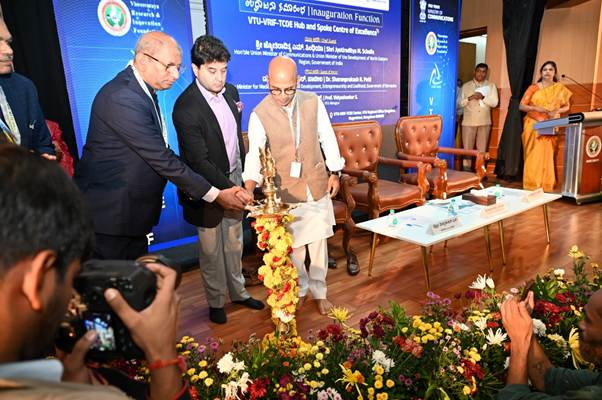Scindia Inaugurates Deep-Tech Excellence Centre to Propel India’s 6G, AI Vision
Minister Scindia toured the facilities, interacting with researchers, students, and startup founders, and expressed strong confidence in the potential of India’s youth to shape the future of global deep-tech.

- Country:
- India
In a major boost to India’s aspirations of becoming a global innovation powerhouse, Union Minister of Communications and Minister for Development of North Eastern Region, Shri Jyotiraditya M. Scindia, inaugurated the VTU-VRIF-TCOE Hub and Spoke of Excellence in Bengaluru today. The new Centre of Excellence (CoE) is a tri-partite collaboration between the Visvesvaraya Technological University (VTU), the Visvesvaraya Research and Innovation Foundation (VRIF), and Telecom Centres of Excellence (TCOE) India, designed to catalyze research, entrepreneurship, and skill-building in high-impact frontier technologies.
Bengaluru’s Emerging Role in Global Tech Leadership
At the inaugural event held on the VTU campus, Minister Scindia underscored Bengaluru’s pivotal role in India’s tech ecosystem, referring to it not just as India’s Silicon Valley, but as a city poised to redefine global tech leadership:
“The world calls Bengaluru India’s Silicon Valley. But I say—in the next decade, Silicon Valley will be seen as a version of Bengaluru. This is a city where code is written over coffee, satellites are launched before traffic signals, and startups are born every minute.”
The CoE is expected to be a launchpad for deep-tech research and startup incubation, focusing on emerging domains such as:
-
5G and 6G communications
-
Artificial Intelligence (AI) and Machine Learning (ML)
-
Quantum computing
-
Augmented/Virtual Reality (AR/VR)
-
Healthcare innovation
-
Cybersecurity and smart infrastructure
Building a World-Class Innovation Ecosystem
The Centre is envisioned as a national hub for collaborative R&D and industry-academic partnerships, bringing together:
-
20+ startups
-
30+ academic institutions
-
Industry leaders like Keysight Technologies, QpiAI, and Televerge
-
Skill-building support from the Telecom Sector Skill Council (TSSC)
This expansive innovation ecosystem is structured under the “Hub and Spoke” model, where Bengaluru will serve as the innovation nucleus, with satellite research and training nodes across Karnataka and other states.
Minister Scindia toured the facilities, interacting with researchers, students, and startup founders, and expressed strong confidence in the potential of India’s youth to shape the future of global deep-tech.
A Shift in Governance: From Regulation to Facilitation
In his keynote address, Shri Scindia highlighted the broader policy transformation under Prime Minister Shri Narendra Modi, emphasizing the government's evolving role:
“In the last 11 years, PM Modi has fundamentally redefined the role of government—from a regulator to a facilitator. This Centre is a direct extension of that transformation.”
The Minister pointed to the phenomenal expansion of India’s digital infrastructure, stating:
-
Internet users grew from 250 million to over 974 million
-
Broadband subscriptions now exceed 940 million
-
India is developing the world’s largest optical fiber network, a digital highway that will revolutionize connectivity for 1.4 billion people
India’s Evolution: From IT Services to Product Innovation
Shri Scindia also drew attention to India’s rise as a global product exporter, especially in electronics:
“We once imported 90% of our mobile phones. Today, India is exporting mobile phones worth over ₹2.5 lakh crore, including to the US. It’s time we move from being the world’s back office to becoming its innovation engine.”
He reiterated the need to invest in deep-tech innovation to fuel India’s transition from a service-led IT economy to a product-driven digital superpower.
Leadership and Collaboration at the Inauguration
The inauguration was attended by a host of eminent dignitaries and sector leaders, including:
-
Dr. Sharanprakash R. Patil, Karnataka’s Minister for Medical Education and Skill Development
-
Prof. T.G. Sitharam, Chairman, All India Council for Technical Education (AICTE)
-
Dr. S. Vidyashankar, Vice-Chancellor, VTU
-
Senior executives from technology firms and government departments
Their presence signaled a strong alignment between academia, industry, and policy, critical for building an inclusive, future-ready tech ecosystem.
Bharat 6G Alliance Review Meeting to Follow
Later in the day, Minister Scindia will chair a high-level review meeting of the Bharat 6G Alliance, a strategic initiative to advance India’s leadership in next-generation telecom standards. The review will assess progress made by the Alliance’s seven working groups, each focused on specific areas such as standards development, spectrum strategy, indigenous R&D, and global partnerships.
India’s active participation in shaping 6G technologies is seen as vital to ensuring technological sovereignty and global competitiveness, especially in critical sectors like defense, healthcare, smart cities, and autonomous systems.
Vision Ahead: Empowering Youth, Driving Innovation
The VTU-VRIF-TCOE Centre of Excellence represents a strategic milestone in India’s innovation journey, and is poised to:
-
Empower students with advanced skill sets and industry exposure
-
Enable startups to scale deep-tech ideas into viable businesses
-
Accelerate IP generation and tech commercialization
-
Strengthen India’s presence in the global R&D value chain
“This Centre is not just about cutting-edge technology,” said Scindia. “It’s about creating a generation of thinkers, builders, and leaders who will transform India—and the world.”










